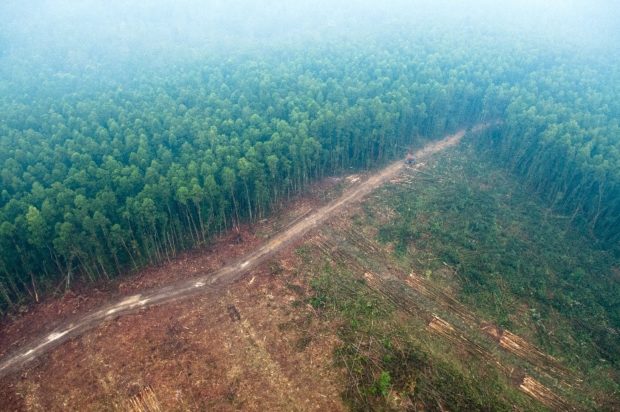We have much more to do and your continued support is needed now more than ever.
WE ARE STILL IN: Global Gathering for Climate Action will Benefit Wildlife

Despite the U.S., the world moves toward a low-carbon future
As they say in show business, “the show must go on”. Things are no different in the climate world.
Trump’s announcement earlier this year made clear his intention to withdraw the United States from the Paris Agreement; this agreement seeks to strengthen the global response to the threat of climate change. With Nicaragua and Syria recently announcing their official support, the U.S. now stands alone as the only country saying they will not follow through with the climate agreement. With millions of Americans calling for action on climate, we must stand alongside the global community and fight for action and progressive leadership.
By withdrawing from the Paris Agreement, the U.S. will miss economic opportunities enjoyed by other countries. A low-carbon, clean energy economy supports thousands of jobs and can attract billions of dollars to the U.S. economy. The nearly 200 countries committed to the Paris Agreement recognize the value in a low-carbon future and remain committed to cutting emissions. How can the U.S. claim global leadership when our country is clearly lagging behind on climate?

Across the country, states, cities, universities, and businesses are rising up today to say “We Are Still In“– we are committed to climate action, regardless of what the administration says. People want to bring about change. People want to be empowered. There is hope. We can still take action in our schools, in our communities, and in our homes to avert the worst impacts of climate change. The National Wildlife Federation is celebrating today’s “We Are Still In” Day of Action, and all who are helping show the world that the United States is still dedicated to climate action.
Setting the rules to play
Country representatives are meeting right now in Bonn, Germany (although the meeting is officially hosted by Fiji) for the 23rd United Nations Climate Change Conference of the Parties (COP 23). While a skeleton U.S. delegation is present for the negotiations (fortunately including capable and well-respected negotiators), it is unclear what their ultimate aim is. NWF’s International Conservation team is in attendance to follow several important topics that will affect wildlife and wildlife habitat.

Over the past two years, countries have been working out strategies for how they will contribute to the collective Paris Agreement goal to limit average global temperature increase to “well below 2 degrees C”. During this year’s conference, negotiators are actively discussing the ‘rulebook’ for implementing and reporting on their commitments (known as Nationally Determined Contributions, or “NDCs” in United Nations speak). We’re hoping for significant progress during these two weeks as the deadline for completing the rulebook is 2018.
Many countries have noted the land-use sector (forests and/or agriculture) in their national commitments as a key area for emissions reductions. This sends a positive signal that they recognize the enormous potential for progress if deforestation can be halted, forests regrown, and emissions from industrial agriculture curbed. Currently, land-use accounts for nearly a one-quarter of all global emissions, while simultaneously having the potential to drastically reduce carbon in the atmosphere (through plants’ ability to sequester carbon); better care for forests and agricultural land can also yield significant benefits for people and wildlife. Yet details around how NDC progress will be measured and reported in a transparent way are still in development.
Companies in on the action
Countless events are happening on the sidelines as the official negotiations focus on the Paris Agreement rulebook. One common topic across many of these events is how ‘non-country actors,’ like the private sector or states like California, will play a role in supporting national commitments.

Big companies have the opportunity to change the meaning of ‘business as usual’ by embracing sustainable business practices. Private sector demand for agricultural land is the leading driver of global deforestation and a significant source of greenhouse gas emissions. Continued deforestation can have devastating effects on future agricultural production (for example, by altering local and regional rainfall patterns). Continued deforestation for agriculture can threaten important habitat for wildlife like the green-headed tanager, which is found in the dry forests in southern Brazil and northern Argentina.
Many companies have already stepped up, committing to ‘zero deforestation’ sourcing and production. These commitments have typically targeted iconic areas like the Amazon rainforest and the rainforests in Indonesia. But just last month, some of the world’s largest food companies announced their intention to help stop deforestation in the Brazilian Cerrado, a lesser known, yet equally important ecosystem. Informal discussions at the conference are also covering how to best align these private sector approaches with national commitments.
Stay tuned for updates from Germany
Cooperation among everyone – nations, states, communities, and companies, is needed to move forward on climate change. COP23 in Germany is an opportune moment for all of us to gather in unity to jointly declare “we are still in”!
Stay tuned for updates as NWF’s International team follows negotiations and discussions at the climate change conference in Germany.
What you can do now
Today is the “We Are Still In” day of action. Join NWF to take action and tell Congress: “Step up and lead on climate action!”
Stay tuned for updates as NWF’s International team follows the negotiations and discussions at the climate change conference in Germany.






















